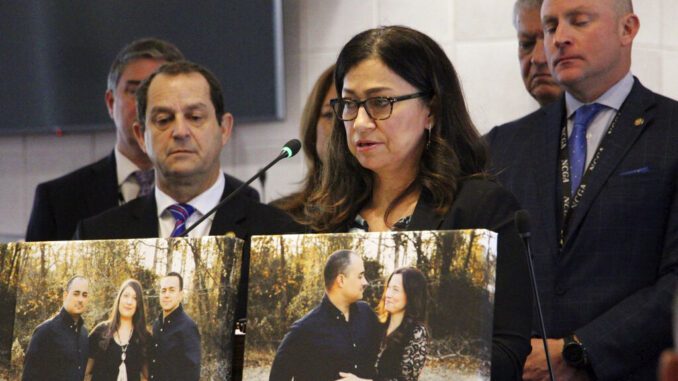
State lawmakers nationwide are responding to the deadliest overdose crisis in U.S. history by pushing harsher penalties for possessing fentanyl and other powerful lab-made opioids that are connected to about 70,000 deaths a year.
Imposing longer prison sentences for possessing smaller amounts of drugs represents a shift in states that in recent years have rolled back drug possession penalties. Proponents of tougher penalties say this crisis is different and that, in most places, the stiffer sentences are intended to punish drug dealers, not just users.
“There is no other drug — no other illicit drug — that has the same type of effects on our communities,” said Mark Jackson, the district attorney for Douglas County, Nevada, and president of the Nevada District Attorneys Association, which is pushing for stricter penalties for fentanyl-related crimes.
Since 2020, drug overdoses are now linked to more than 100,000 deaths a year nationally, with about two-thirds of them fentanyl-related. That’s more than 10 times as many drug deaths as in 1988, at the height of the crack epidemic.
Fentanyl mostly arrives in the U.S. from Mexico and is mixed into supplies of other drugs, including cocaine, heroin, methamphetamine and counterfeit oxycodone pills. Some users seek it out. Others don’t know they’re taking it.
Ingesting 2 milligrams of fentanyl can be fatal, meaning 1 gram — about the same as a paper clip — could contain 500 lethal doses.
That’s what’s driving some lawmakers to crack down with harsh penalties, along with adopting measures such as legalizing materials to test drug supplies for fentanyl and distributing naloxone, a drug that can reverse overdoses.
Before this year’s legislative sessions began, a dozen states had already adopted fentanyl possession measures, according to tracking by the National Conference of State Legislatures.
In Nevada, where Democrats control the Legislature, a bill backed by Democratic Attorney General Aaron Ford would give one to 20 years in prison for selling, possessing, manufacturing or transporting 4 grams or more of fentanyl into the state, depending on the amount. It’s a change for Ford, who has supported criminal justice reforms including a sweeping 2019 law that, among other provisions, raised the threshold for such penalties to 100 grams. It would also remove fentanyl from the state’s “Good Samaritan” law, which exempts people from criminal drug possession charges while reporting an overdose.
“What we’ve learned is that lowering the thresholds for all drugs was overinclusive,” Ford said.
Harm reduction advocates are pushing Ford and others to rethink their support, arguing the thresholds for longer penalties can sweep up low-level users — not just the dealers the law is aimed at — as well as some who may not even know they are taking fentanyl. They warn that the state’s crime labs test only for the presence of fentanyl, not the exact amount in a mixture of drugs. Thus, people with over 4 grams of drugs containing a few milligrams of fentanyl could be subject to trafficking penalties, they say.
North Carolina’s Senate unanimously passed legislation two weeks ago to increase criminal penalties for drug dealers whose distribution of fentanyl and other controlled substances causes an overdose death.
The proposal, which currently sits in the House, would create high-grade felony offenses for deaths caused by distributing the powerful synthetic opioid, and for doing so with malice.
It would also increase fines for trafficking heroin, fentanyl and carfentanil — a synthetic opioid generally used as a tranquilizer for elephants and other large mammals — and amend the state’s Good Samaritan law to create limited immunity for someone in possession of less than one gram of fentanyl who calls 911 to report an overdose.
“This piece of poison called fentanyl is killing people every day in North Carolina and all across America,” said Sen. Tom McInnis, a Moore County Republican and primary sponsor, during floor debate.
Fentanyl was likely involved in the overdose deaths of more than 3,000 North Carolinians in 2021, according to the most recent available data from the state’s Department of Health and Human Services.
The bill says dealers with lengthy records who commit these crimes with aggravating circumstances could face more than a decade in prison. Those who act with malice could face more than 30 years in prison. The proposal is supported by the North Carolina Sheriffs’ Association.
A previous version of the bill moved through the Senate in 2019 but never made it to the House.


